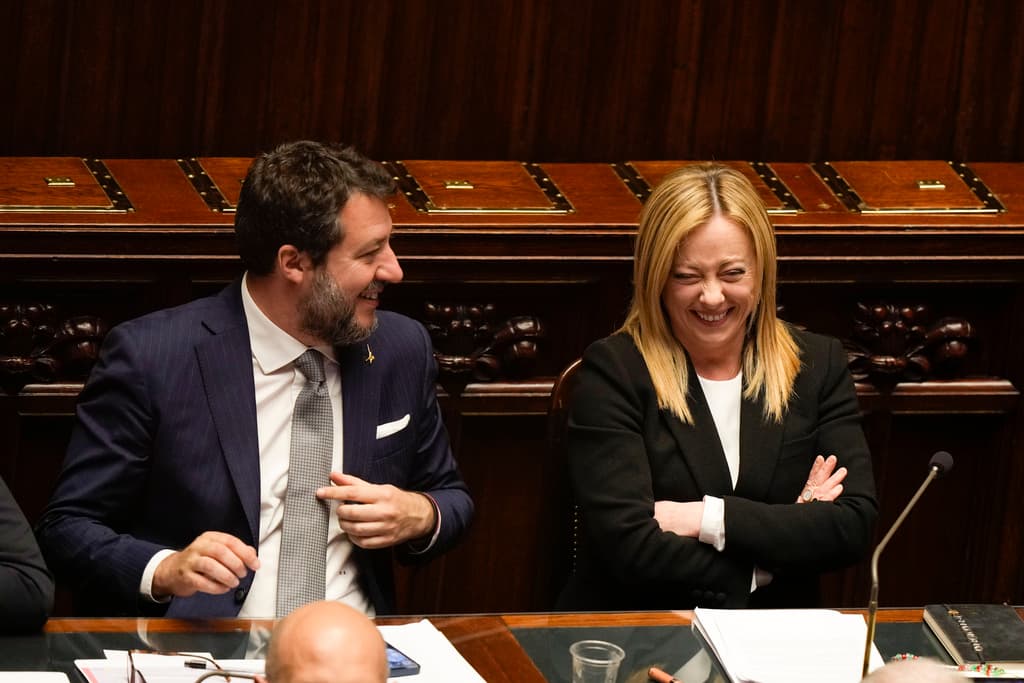Perception of Italy’s Giorgia Meloni as a Wild-Eyed Firebrand Starts To Wane, as She Tacks for Rational Decision-Making
Particularly so in respect of the economy, as she rides herd on spending.

Shakespeare’s Macbeth wrestled with his vaulting ambition, fearing that it would o’erleap itself and lead to ruin. One of Italy’s top populist conservatives, Matteo Salvini, has also grappled with the demons of his ambitions. While he is no Macbeth — even if he ultimately wants to succeed Ms. Meloni at Palazzo Chigi — his antics increasingly pose a challenge for Italy’s economic revival.
Though Ms. Meloni and Mr. Salvini are in a conservative coalition — and have succeeded in forging a center-right government of consequence — the two are often at odds. Some differences are ideological. While Ms. Meloni is a pragmatic free-market advocate who waves the tricolore, Signore Salvini’s convictions are more malleable. At heart, he is a populist with a center-right veneer.
The most recent dust-up centered on an Italian army general, Roberto Vannacci, and his a self-published book that disparaged minorities, gays, and feminists, “Il Mondo al Contrario,” or “The World Upside Down.” The general went so far as to lavish praise on Vladimir Putin’s Russia, where he had worked in the Italian embassy.
Fluent in various foreign languages, General Vannacci also helmed the elite Folgore paratroopers. He was serving as the head of the Military Geographical Institute at Firenze when the controversy erupted. The Defense minister, Guido Crosetto, acted swiftly, initiating disciplinary action. The Army general staff on August 18 removed General Vannacci as head of the institute.
Mr. Crosetto, a co-founder of Ms. Meloni’s party, Fratelli d’Italia, castigated “those who call themselves ‘right-wingers’ and fill their mouths with the concepts of homeland, honor, tradition and national pride,” yet “show that they do not know, or know very little” about “what it means to have a sense of state, institutions, respect for Italian laws and the Republican Constitution.”
While praising the general’s military service, key Fratelli d’Italia figures nevertheless agreed with Mr. Crosetto — and Signora Meloni, who backed her defense minister’s response. Mr. Crosetto, who commands respect at home and abroad, has launched a “New Look” foreign policy with the armed forces as an instrument of operational support and a force multiplier for Italy abroad.
However, in a seeming attempt to outflank Ms. Meloni on the right — while solidifying his hold on the leadership of his Lega — Mr. Salvini telephoned General Vannacci, a self-serving gesture that widened his fissure with the prime minister. After last month’s ham-handed windfall-profit bank tax announcement, Ms. Meloni’s government can ill afford to rattle the markets with erratic economic schemes or populist virtue-signaling.
In an effort to toe the fiscal line, Ms. Meloni railed against the prior government’s tax credit for green home improvements, labeling it a scam: “We cannot afford waste, we are paying heavily for the disaster of the 110 percent Superbonus,” she said, inviting her finance minister, Giancarlo Giorgetti, “to show us the numbers of this accounting tragedy that weighs on the shoulders of all Italians.”
With Mr. Giorgetti riding herd on spending, hope abides that Italy’s huge deficits can be trimmed. Mr. Salvini’s antics aside, the perception of Ms. Meloni as a wild-eyed firebrand — as the left would have one believe — is waning. A professor at the European University Institute in Italy, Erik Jones, says Ms. Meloni’s government hasn’t morphed into a more “populist” regime.
Rational economic decision-making is the order of the day. On fiscal policy, Eurasia Group’s Federico Santi told CNBC that “even in the absence of binding EU rules,” Ms. Meloni’s “government has made efforts to continue a gradual fiscal adjustment,” as in “keeping the deficit and debt on a, slowly, declining path and avoiding broad-based expansion that could feed inflation.”
Yet the Magic Boot’s debt reached 144.4 percent of Gross Domestic Product in 2022, according to the International Monetary Fund, and fell only slightly, to 140.5 percent this year — and likely 138.8 percent in 2024. The IMF predicts that the Italian economy will grow by just 1.1 percent this year — and 0.9 percent in 2024, a decline from 2022’s GDP growth of 3.7 percent.
However, prudent management of the EU’s 35-billion-euro recovery funds this year, and next year’s 26-billion-euro allotment, may lead to an upward revision of Italy’s GDP growth. Such an outcome is entirely possible — and more than feasible — if sound economic policies prevail over the machinations of overzealous populists.

